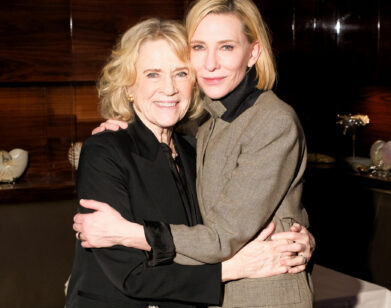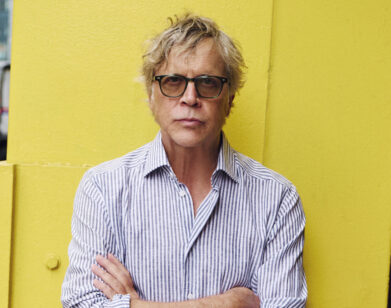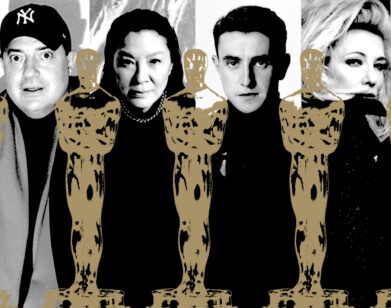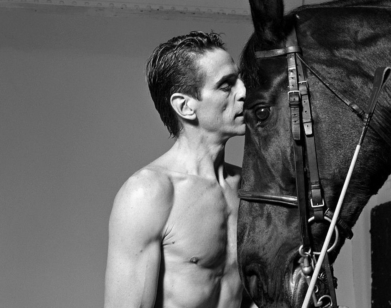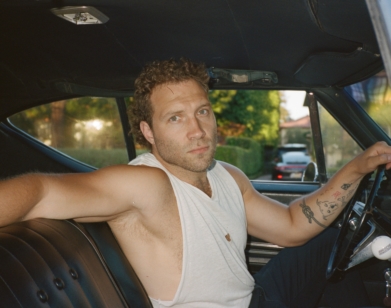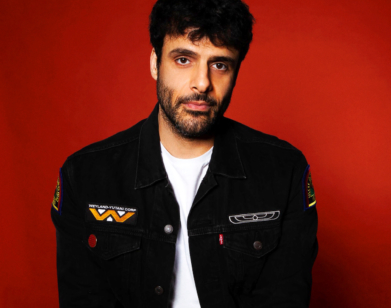The Inimitable Cate Blanchett Asks Julia Roberts the Timeless Question: Is Enough Enough?
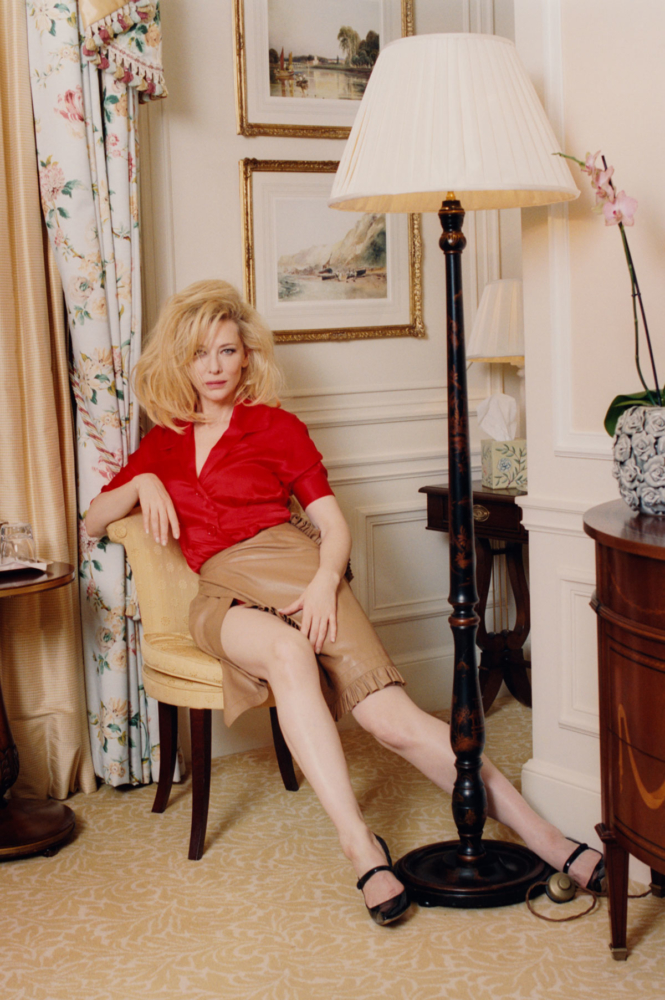
Shirt and Skirt by Burberry. Shoes (worn throughout) by Manolo Blahnik.
Cate Blanchett does not play nice. Her performances almost always hinge on the unhinged. Although she is nothing if not regal—audiences will forever remember her as Queen Elizabeth I, a part that earned her the first of her seven Oscar nominations—Blanchett has never backed away from malice and mania, or what she describes as the “King Lear end of the spectrum.” The 49-year-old Australian actress has stalked down the darker corridors of human complexity by inhabiting a sexually repressed housewife in Carol, a shrill and martini-drowned socialite in Blue Jasmine, and, most recently, an agoraphobic architect in Richard Linklater’s adaptation of the Maria Semple novel Where’d You Go, Bernadette, out later this year. And yet, from a hotel room near London’s National Theatre, where she has been taking the stage in a production of When We Have Sufficiently Tortured Each Other, Blanchett wonders whether enough is enough. From across the ocean, at home in Los Angeles, Julia Roberts helps her grapple with the answer.
———
JULIA ROBERTS: Hello, Queen Cate.
CATE BLANCHETT: Hello, movie star. You want to know something? We just had your film Ben Is Back on, I kid you not. It made me cry after five minutes. And then, being totally brain-dead, I suddenly thought, “What day is it?” An alarm went off in my head, and I went, “I’ve got to go talk to that actress lady!”
ROBERTS: You want to talk about being brain-dead? I’ve had the craziest day. I woke up sick, and I was at Urgent Care for an hour and a half with one of my son’s friends who cut his foot when he was surfing. He got eight stitches.
BLANCHETT: You are a good friend. I’ve just had a half-bottle of red after a rather challenging day of rehearsal for a play I’m doing at the National Theatre [When We Have Sufficiently Tortured Each Other]. As you get older, acting just gets more and more humiliating. When I was younger, I would wonder why the older actors I admired kept talking about quitting. Now I realize it’s because they want to maintain a connection to the last shreds of their sanity. As I get older, I ask myself if I still want to submit myself to the shamanistic end of this profession and go completely into madness. It’s the King Lear end of the spectrum of what we do, right? So I’m on the proverbial couch thinking, “Do I want to go that direction, or do I actually want to live a life?”
ROBERTS: The great thing about doing theater is that there’s never really a “This is it” moment. There’s that alchemy every night.
BLANCHETT: And I certainly love that alchemy as an audience member.
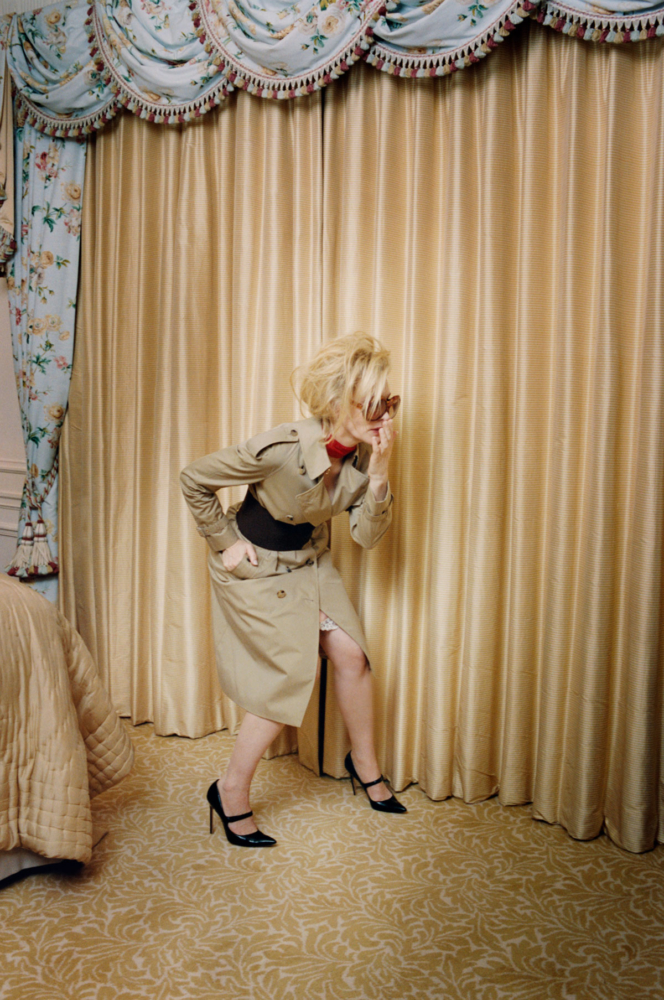
Coat by Burberry. Vintage Slip Stylist’s Own. Sunglasses by Oliver Goldsmith. Vintage Scarf from Rockit.
ROBERTS: What are you up to right now?
BLANCHETT: At the moment I’m thinking, “Where do the radical ideas actually exist?” I gravitate toward museums and galleries but often they tend to speak predominantly to audiences that have time to go into that quietude. There are such large sections of our communities that don’t have the time because they’re working two or three jobs. But what I love about those things is that they get to deal with abstract ideas. We get so used to these narrative structures, but there are certain ideas that don’t fit into that slot, so I’m finding my work with visual artists or choreographers more rewarding at the moment than the cookie-cutter projects.
ROBERTS: For someone like you, it probably has to do with the fact that you have accomplished so many things on such an incredibly creative level.
BLANCHETT: Maybe it’s just time to stop.
ROBERTS: Stop saying that.
BLANCHETT: No, but it really is. I have to go onstage in my underwear yet again, and I’m thinking, “Why? Why don’t I just feed the chickens and read Proust?” It’s on my bookshelf staring at me right now. All these volumes I have purchased and not yet read. Why have I not picked those up? Why am I still bothering to make movies? Why do you make movies?
ROBERTS: They call to me.
BLANCHETT: Is it a response to someone else’s idea of who you might be?
ROBERTS: I think the first time that Danny [Moder, Roberts’s husband] and I worked together after we were married was the first time that I suddenly thought, “Oh my gosh, what I do for a living is so silly. I’m calling myself a different name. I’m wearing somebody else’s clothes. And I’m basically playing pretend on a huge scale.” I had never been so self-conscious until I was suddenly doing it in front of my husband, thinking, “What must he think?”
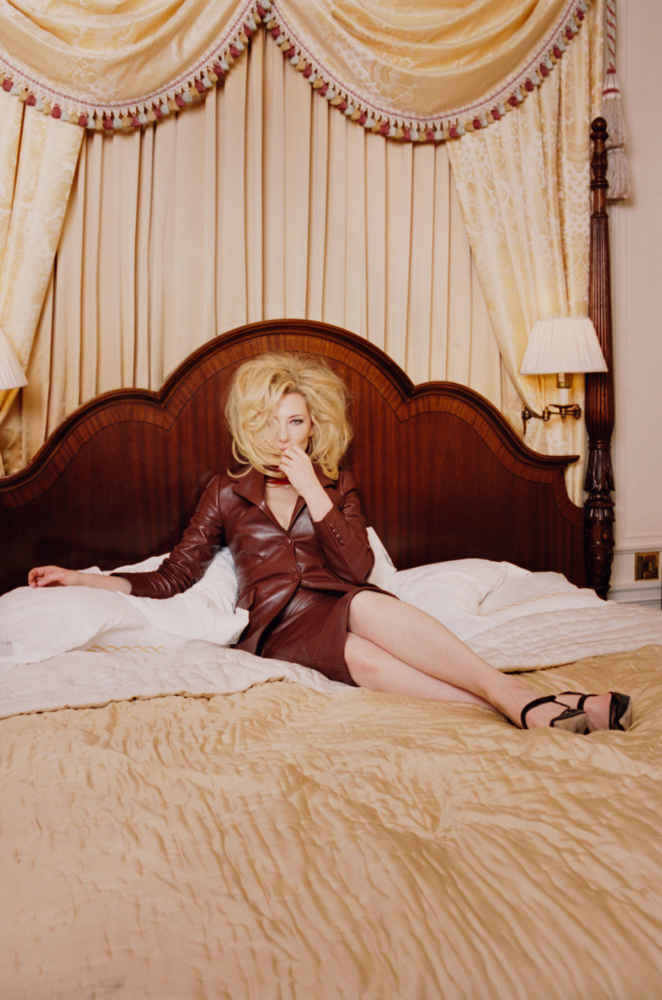
Jacket and Skirt by Miu Miu. Vintage Scarf from Rockit.
BLANCHETT: When you’re so inside a richly lived life, you suddenly think, “Do I need to pretend to live inside these other experiences?” When you have a richly lived experience, you can empathetically extrapolate out from there. That’s what women like Rachel Cusk and Maggie Nelson do in their writing. And that’s where I found Bernadette. I recognized something very deeply about a creative life that shuts down.
ROBERTS: And yet, you want to stay home and feed the chickens.
BLANCHETT: I’m quite happy sitting here looking at my unread Proust, talking to you and feeding my pigs. I was a vegetarian for years when my husband wanted to get pigs. I said, “I’ll get pigs as long as we tell the kids that the sausages and bacon they eat are from our pigs.” We called them Benson and Hedges.
ROBERTS: You can’t name something that you’re going to kill. That’s the number-one rule of being a farmer.
BLANCHETT: [Laughs.]
ROBERTS: And now they’re in the freezer.
“I have to go onstage in my underwear yet again, and I’m thinking, ‘Why? Why don’t I just feed the chickens and read Proust?'” —Cate Blanchett
BLANCHETT: It was this Machiavellian vegetarian plan that I had for my kids, that they would form this deep connection with the piglets, which were very cute and smelled kind of like smelly people. And then I would tell them that if we eat sausages, they’re coming from these pigs. The kids were just totally fine with that and I was horrified. My plan to turn my family vegetarian was a monumental failure.
ROBERTS: What type of roles do you automatically turn down? Is there such a thing?
BLANCHETT: When I feel like it’s a pre-masticated version of something I’ve already done? Like a margarine commercial, where the agency thinks, “This worked before, so, hey, let’s do it again!” After I played Queen Elizabeth, I got offered myriad roles that were basically the same story with a different costume. There was no potential for discovering anything new. There’s no risk.
ROBERTS: In Where’d You Go, Bernadette, you play the spouse of Billy Crudup, one of my favorite actors and someone who played my spouse in a film [Eat Pray Love].
BLANCHETT: We worked together years ago on a film in France called Charlotte Gray. He’s so open and egoless. As we all know, that is rare in a male actor. How many times have you and I said, “That’s a great role—I’m not the lead, but the male lead is a great actor and I’d really love to be a part of this project”? Invert that, and you don’t have a lot of men who would come to the party in the same way for a woman. Billy is one of those guys who says yes. It’s rare that you get an actor of his caliber who is prepared to play the so-called “husband role.” The best thing for me about this post–[Harvey] Weinstein era is the opportunity to learn from it. We can change the structure, to have horizontal conversations rather than hierarchical ones. That’s a matriarchy. I think the opportunity here is to reinvent the power structure so that it is genuinely more inclusive. It’s not about competition—it’s about collaboration.
ROBERTS: You’re incredible. Honestly, I could sit and just listen to you talk about things for hours.
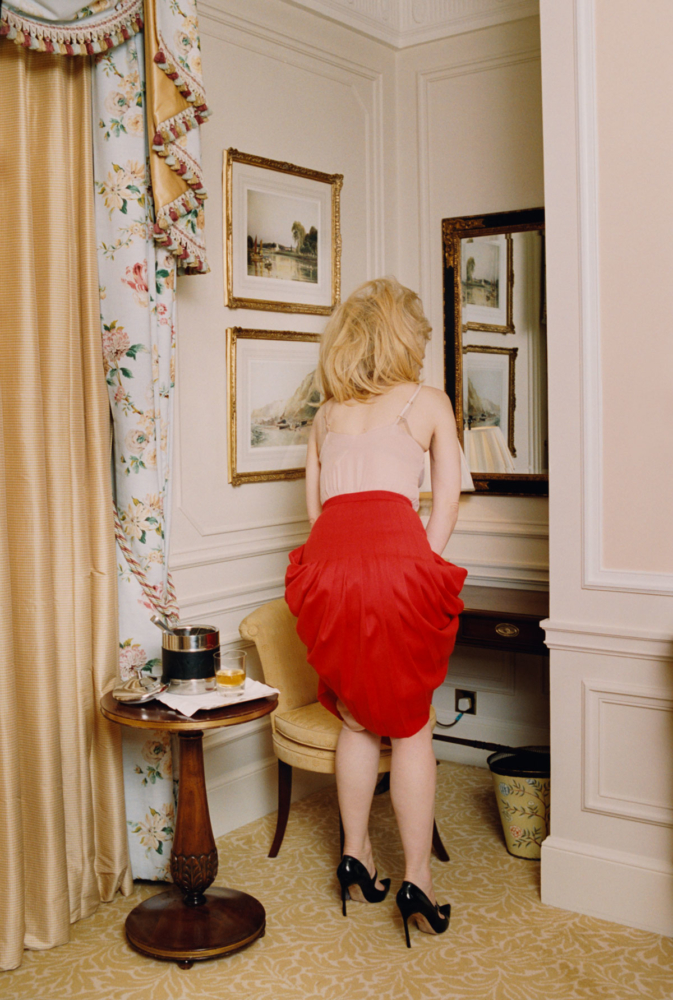
Slip by Araks. Skirt by Gucci.
BLANCHETT: I wish I were interviewing you. It feels a little like a veil has been lifted, and we’re talking to one another in a muscular way about stuff that we’ve had to deal with. We can all pretend that we live in a community, but we actually live in a capitalist environment and our worth is being measured in dollars. It’s a really boring conversation to have because when you talk about the creative industry, it’s always seen as, “Well, you’re famous. You’ve got the opportunity to do this, and now you’re being greedy to talk about money.” But you’re not. You’re talking about really practical things such as residuals, producing credits, insurance. In the end, you’re actually talking about status. And status opens doors, whether you’re in the banking sector or the film industry or whatever. They’re not attractive conversations. They’re not conversations that women are traditionally meant to have because we’re expected to be more demure, but there are certainly robust “masculine” compensations that are had by our male counterparts, so why shouldn’t we be a part of that dialogue?
ROBERTS: Do you have a nickname?
BLANCHETT: Maybe it should be Blabbermouth? Sometimes my husband calls me Poss, like possum. Do you have one?
ROBERTS: When my kids’ friends were little, they couldn’t say Julia, because it’s a lot of syllables, so they’d call me Juju. They still call me that.
BLANCHETT: That is really sweet. You are such a mensch.
ROBERTS: Juju and Poss, a love story.
———
Hair: Eamonn Hughes using HAIR BY SAM MCKNIGHT at PREMIER HAIR AND MAKE-UP
Makeup: Mary Greenwell using ARMANI BEAUTY SKINCARE AND MAKEUP at PREMIER HAIR AND MAKE-UP
Production: Etty Bellhouse at BELLHOUSE MARKES
Photography Assistants: Ryan O’Toole, Matt Moran
Fashion Assistants: Malaika Crawford, Giovanni Beda
Tailor: Alison O’Brien
Makeup Assistant: Katie Brydon Jones
Manicure: Anatole Rainey using SISLEY PARIS at PREMIER HAIR AND MAKE-UP
Production Assistant: Polly Woollard at BELLHOUSE MARKES
Special Thanks: The Savoy Hotel London

